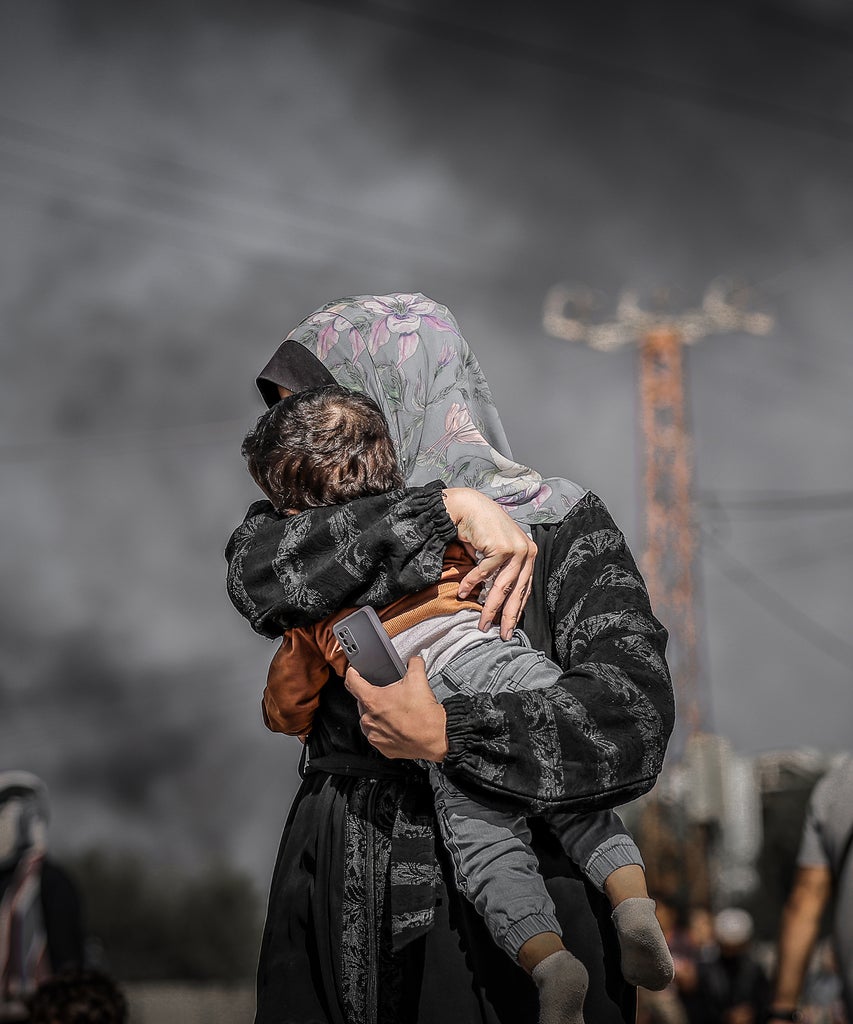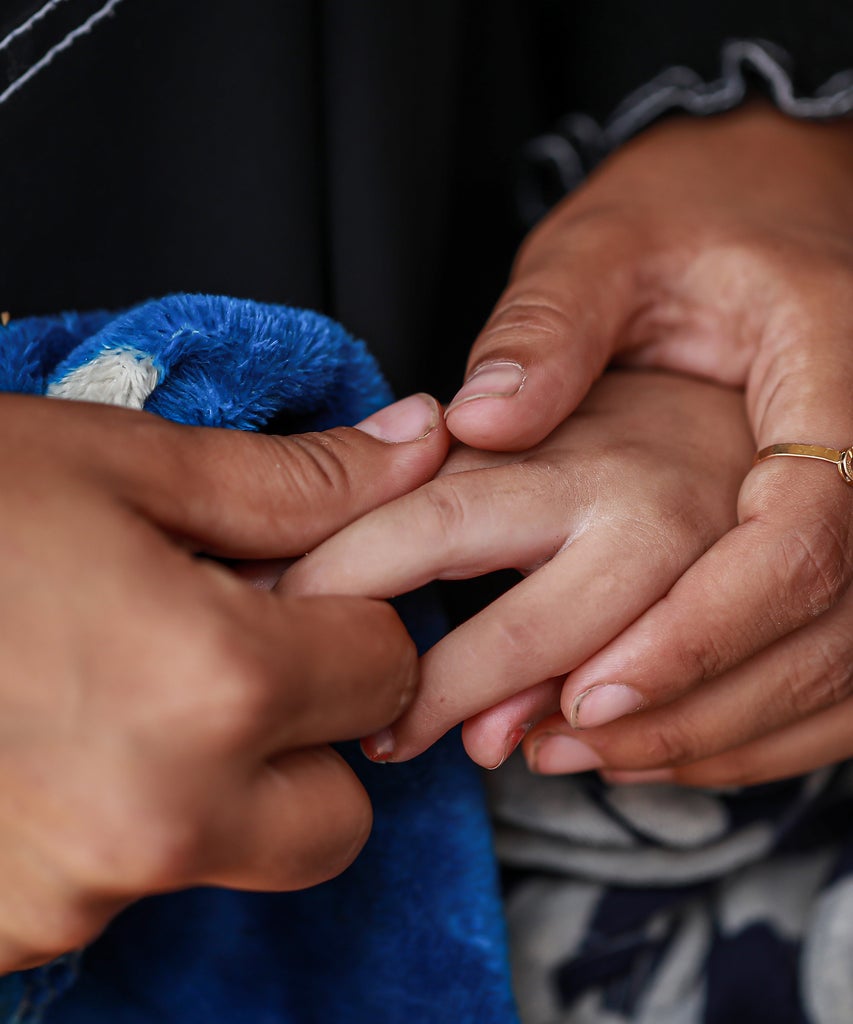
For some reason that neither myself nor my therapist can identify, my biggest fear is that I’ll run out of time. The most dire way I imagine my fear playing out is death — before I’m ready to go — and this fear has only multiplied since I’ve become a mother. Now, I not only worry about leaving my children, but I worry about them leaving me. I am supposed to grow old, with my two beautiful, accomplished, smart, and secure adult daughters on either side of me, holding my hands and granting me permission to go. I am not supposed to be taken from them before they’re ready, and they most definitely aren’t supposed to be taken from me.
I can usually pull myself out of spiralling into the depths of this anxiety, but lately, my coping skills have lost their strength. How do I cope when the same phone that holds personal documentation of me and my kids is also a portal to a burning Palestine, displaying the ways my worst fears are reality for mothers and their children there? Gaza, Jabalia, and Rafah are thousands of miles away, but the emotional ties of motherhood in these times transcend borders.
If the children all over the globe are ours, how can I transform hopelessness into helpfulness when they’re suffering?”
BEE QUAMMIE
The statistics are terrifying: In January, UN Women stated that two mothers are killed every hour in Gaza. Exact figures are difficult to come by, but the U.N. recently shared that out of the estimated 35,000 people killed by Israeli forces in Gaza, almost 25,000 have been identified — and women and children make up 52% of that number. Cesarean sections are being done without anaesthesia, baby formula is being made with contaminated water, and critical needs like food and hygienic supplies are scarce due to Israeli blockages and bombardment.
Even with the best of care, pregnancy, delivery, and the motherhood journey can be extremely frightening. As a Black mother, I worried about everything from maternal mortality rates to the pain of delivery to how successful I’d be at breastfeeding. And while it’s true that people have given birth in all kinds of ways before the existence of modern medicine, it’s also true that no one should bring life into this world under a cloak of horror and without proper care. This is the reality for so many Palestinian mothers, but people are determined to step in. Organisations like the Safe Birth In Palestine Project have been doing their best to provide support and assistance in Gaza, helping expecting and postpartum folks in spite of the difficulties. Medical kit deliveries have been blocked at the border, but some Project members have been able to travel to the Gaza Strip with prenatal vitamins and medical supplies. “We were naive. We were honestly hoping that there would be a safe corridor, safe zone for medical facilities, Safe Birth co-founder Ferhan Güloğlu said to the Guardian. “It’s one of the worst crises, if not the worst, on women and children. In Afghanistan, hospitals were a safe space, but here it’s not.” The Safe Birth team is committed and plans to support the rebuilding of the region’s medical system, with a particular focus on psychological care for mothers and their children.
In an unfair world, I am raising my kids with the aim that others feel safe with them. Acceptance, openmindedness, and generosity are traits that I nurture in my daughters, and traits that I hope serve them well as good people. When encountering people whose lives differ from their own, tolerance isn’t even the bare minimum, it’s nonexistent on my decency scale. Being tolerated is not the same as being respected, welcomed, seen, heard — and one does not need to understand another’s life in order to respect, welcome, see, and hear them.
“[What’s happening in Gaza] is one of the worst crises, if not the worst, on women and children.”

Recently, my 6-year-old daughter caught me scrolling Instagram and saw a picture of a Palestinian child crying after being displaced in a tent camp. As she draped her brown limbs around my neck and pressed her cheek against mine, she asked what was wrong, and I gently explained what the child was currently living through. She was quiet for a moment, then slid off my back and to her room. She soon emerged, proudly showing me a picture she drew of tiny footprints on green land, representing kids that had to leave their homes “but will come back soon,” as she described. My 9-year-old tells me about the conversations at school that centre on kids in Palestine. “Can you imagine if that was me? If that was us?” she asks.
I cannot.
As women and children have grown in the number of dead in Palestine, and as the world has seen babies born from the wombs of dead mothers, children undergoing amputations without anaesthetic, headless toddlers and limbless kids, orphaned youth and numerous other atrocities, a James Baldwin quote has resurfaced across social media:
“The children are always ours, every single one of them, all over the globe; and I am beginning to suspect that whoever is incapable of recognising this may be incapable of morality.”
From the privileged vantage point of witnessing all of this through the internet, I suspect the same. I do not need to understand Arabic to recognise the agony in a mother’s voice or the terror in a child’s. I do not need to understand anatomy to know that a baby’s body is not supposed to be broken the way the images show. I don’t need to understand war or politics to know that no one should ever believe that “it is possible to kill children legally.” A history of oppression has shown us that in the past and present, humans lacking morality move among us. And nothing spotlights one’s soullessness like attacks on the one thing all of us on earth have been — a child.
The land has been razed, but seeds are still present. Lives have been taken, but beautiful children exist. The solidarity of motherhood is a global effort, and we carry each other’s pain and joy.
BEE QUAMMIE
I always wonder how people can hurt children, seeing as how childhood is among the most common of shared human experiences. I hypothesise that punitive adults are driven by their wounded inner child, and seeing a child with the freedom or love or opportunity they lacked maddens them. I think that feeble adults who have no power elsewhere in their lives are prone to exerting power over vulnerable children. I surmise that immoral adults see the potential in children as imminent leaders and inheritors of culture and tradition, and choose to end bloodlines and erase the answer to the question: “What could the future hold?” But as Baldwin said, the children all over the globe are ours. The growing chorus of voices echoing this sentiment in the face of the horrors we’ve seen gives me hope that the future will be theirs, too.
On an episode of Al Jazeera’s podcast The Take, host Malika Bilal spoke with Eman Basher, a teacher, writer, and mother from Gaza who recently fled to Cairo with her children, Bilal asked about the experience of living with so much violence and how she comforted them. Basher shared that her eldest son, 6-year-old Faisal, has lived through major conflict before. “Faisal is living this for the third time, so when he first lived it, I lied to him and told him these were fireworks, which he believed the first time,” she explained. “But as he got older he started to feel like I was lying.”
“Why am I not allowed to see it?” Faisal asked. “Why am I not allowed to open the window and look at it directly? Why are some people dying of these fireworks?”
“I felt obliged to tell him the truth,” said Basher. “But I don’t think these are the normal conversations a mother and son are supposed to have.”
I am a Black mother raising Black children, and I think about the abnormal conversations I’ve had with my own daughters. Some have been about how they must move to be safe in the world, and some have been about the safety of children like Faisal. I know that the abnormal conversations will continue, as I am not naive enough to believe we’ll suddenly wake up to a world rid of oppression. I do hope that genocide will be a far-removed topic as they grow.
Hope. It’s a weighty word that carries extra meaning for me as a mother, and brings to mind another Baldwin quote I return to often: “I never have been in despair about the world. I’ve been enraged by it. I don’t think I’m in despair. I can’t afford despair. I can’t tell my nephew, my niece. You can’t tell the children there’s no hope.” I hope that my children have a life better than mine. I hope that they are driven to help others, and that others are driven to help them. I use hope as a buoy when the waves of panic and disillusion threaten to drown me. If I don’t, then what was the point of bringing them here? How can I look at them and be hopeless? And if the children all over the globe are ours, how can I transform hopelessness into helpfulness when they’re suffering?
Helpfulness takes on different forms. As we call for a ceasefire and shout “Free Palestine,” as we donate to GoFundMes, as we protest and boycott, as we confront our political leaders, as we listen and read and learn and amplify, we help. As I think about the shared experience of motherhood, of mothers halfway across the world, of the comradeship I wish someone would show me in my time of dire need, I offer what I can and I help. Maybe in some small way, we are showing the children in Palestine, Sudan, Congo, Tigray, and beyond that there is hope. Maybe in some small way, we are giving a mother a more hopeful today than yesterday.
My fears of death separating my children and I have not been assuaged, but they are now challenged by a new feeling — either audacity that laughs in the face of fright, or respect for the parameters of life. I’m not sure, but what I do know is that I look to the mothers and children of Gaza and believe that renewal is coming. The land has been razed, but seeds are still present. Lives have been taken, but beautiful children exist. The solidarity of motherhood is a global effort, and we carry each other’s pain and joy.
Like what you see? How about some more R29 goodness, right here?
Why Black Feminists Are Standing Up For Palestine